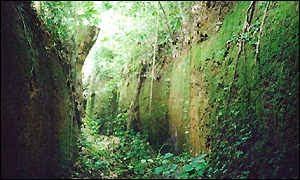Henry Breasted's map of the Fertile Crescent. He coined the term "Fertile Crescent."
Alice C. Linsley
The final of the nine questions asked by a reader of Just Genesis is: "Was the garden of Eden a real place or a myth?"
Eden, as it is described in Genesis 2, was a vast well-watered region that extended from the sources of the Nile in Uganda and Ethiopia to the Tigris and Euphrates in Mesopotamia. This corresponds to the Fertile Crescent described by Henry Breasted (shown above). The biblical writers were aware that this is the cradle of the earliest civilizations.
The term Eden is derived from the Akkadian word edinu which refers to a fertile plain or a well-watered region. Akkadian is the oldest known Semitic language and predates Hebrew by nearly 2000 years. The Akkadian language shares many roots with other Afroasiatic languages. A Yoruba word for the fertile soil of a virgin forest is egàn which is related to the Hebrew word gan, meaning for garden.
Eridu ramparts in the Nigerian jungle
Asar Imhotep made linguistic connections to ancient Egyptian and Yoruba:
Yoruba iju “jungle” is cognate with Egyptian ju “mountain.” The underlying semantic spirit of each term demonstrates a primary connotation of “wilderness.” The wilderness for the Yoruba was the jungle: for the Egyptians it was the inhospitable desert of the red mountains (dsrt). The inhospitable wilderness of the jungle is described in Yoruba as aginju “dark wilderness.” The qualifier agin- (cf. egàn “the soil under the forest cover” – black, fertile, soil) is from the same root oganjo (ogan-jo) “the dark part of the day,” the dead of night, oganjo oru.
Yoruba iju “jungle” is cognate with Egyptian ju “mountain.” The underlying semantic spirit of each term demonstrates a primary connotation of “wilderness.” The wilderness for the Yoruba was the jungle: for the Egyptians it was the inhospitable desert of the red mountains (dsrt). The inhospitable wilderness of the jungle is described in Yoruba as aginju “dark wilderness.” The qualifier agin- (cf. egàn “the soil under the forest cover” – black, fertile, soil) is from the same root oganjo (ogan-jo) “the dark part of the day,” the dead of night, oganjo oru.
(The word for mountain in Ancient Egyptian is usually transcribed djew, not ju.)
According to Genesis, the garden would have been east of Noah's homeland in the region of Lake Chad. In the language of the local Kanuri, Lake Chad is Bahar Nuhu, meaning "Sea of Noah." Other place names in that region are Benue and Borno. These place names mean "land of Noah."
According to Genesis, the garden would have been east of Noah's homeland in the region of Lake Chad. In the language of the local Kanuri, Lake Chad is Bahar Nuhu, meaning "Sea of Noah." Other place names in that region are Benue and Borno. These place names mean "land of Noah."
Genesis 3 states that God drove Adam and Eve out of the garden and caused them "to dwell east of the garden." The same explanation appears in reference to Cain's banishment to the "east of Eden" (Gen. 4:15). These early Hebrew were moving east, and the way back was closed by the angels stationed on the east of the garden (Gen. 3:24).
Related reading: Eden: A well-watered region; The Search for Eden; An Anthropologist Looks at Genesis 3




.jpg)








